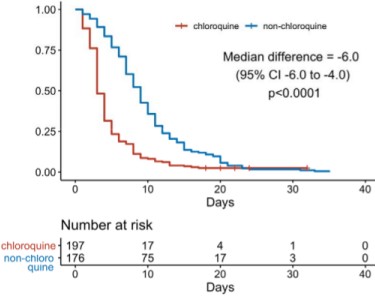
nother observational study[1] came out the other day showing a highly significant effect of chloroquine in reducing the amount of SARS-CoV-2 virus. Details and unofficial peer-review are here.

Virus Kaplan-Meier curve from Huang et al. (2020) [1]
It's not the randomized placebo-controlled trial we've been waiting for, and the study is far from perfect, but their graph shows a highly statistically significant difference in the rate of clearance of the virus (see graph). The subjects were all moderately severely infected with SARS-CoV-2. No deaths were reported.
This is only a few days after another trial from Wuhan Tongji Medical College[2] claiming that moderate doses of hydroxychloroquine produced highly significant reductions in mortality in severely ill COVID-19 patients. Details are here.
Other studies have found no significant effect. What's going on? Do these drugs work or not? Why is the science so confused? Several possible reasons:
- There are now many different strains of SARS-CoV-2 virus. Different sources give different numbers. The number increases daily. Here's a phylogenetic map.
- Every study is using a different dose and measuring a different end point.
- Control groups, when they're included, include a variety of other treatments that may obscure the results.
- Very few groups are doing proper randomized placebo-controlled studies.
- Nobody really knows the biochemical mechanism by which CQ and HCQ are supposed to work. The Yu et al. study points to an anti-inflammatory effect, while the Huang et al. study points to an effect on virus activation. There's support in the literature for both possibilities.
Is anyone convinced yet why we need randomized placebo-controlled clinical trials? Why couldn't these things have been tested before it became an emergency?
Here's why. Treating infected patients is dangerous work. Studying the virus in the lab is even more dangerous, in more ways than one. A highly technical article on medium.com just came out describing how virus researchers have been introducing changes into viruses, usually but not always (he claims) creating non-pathogenic viruses. The goal is to identify features responsible for pathogenicity and to create knowledge essential for making vaccines. The author gives the impression of hubris in the field and claims, in contradiction to a number of reports in Nature and elsewhere, that the furin cleavage site in the SARS-CoV-2 DNA sequence looks out of place.
The researchers are being careful and working in BSL-4 containment. If the medium.com author is right, this suggests a potential failure of institutional oversight. I'm on one such committee (though not with viruses) and there's definitely a certain amount of pressure to assume that an accident won't happen and the safety protocol will be followed if it does. They also know, we hope, that making a mistake is not an option. But given the impact of COVID-19, an investigation will almost certainly take place. Openness may be the PRC's chance to defuse the rising resentment of their past dishonesty.
Update, May 8 2020: An observational study just published in NEJM[3] claims to have found no effect of hydroxychloroquine. The media have misinterpreted the authors' conclusions. I discuss the results here.
1. Huang M, Li M, Xiao F, Liang J, Pang P, Tang T, Liu S, Chen B, Shu J, You Y, Li Y, Tang M, Zhou J, Jiang G, Xiang J, Hong W, He S, Wang Z, Feng J, Lin C, Ye Y, Wu Z, Li Y, Zhong B, Sun R, Hong Z, Liu J, Chen H, Wang X, Li Z, Pei D, Tian L, Xia J, Jiang S, Zhong N, Shan H (2020) Preliminary evidence from a multicenter prospective observational study of the safety and efficacy of chloroquine for the treatment of COVID-19. MedrXiv preprint. doi: https://doi.org/10.1101/2020.04.26.20081059. Not yet certified by peer review
2. Yu, B., Wang, D. W., Li, C. (2020). Hydroxychloroquine application is associated with a decreased mortality in critically ill patients with COVID-19 https://www.medrxiv.org/content/10.1101/2020.04.27.20073379v1.full.pdf 10.1101/2020.04.27.20073379 Not yet certified by peer review
3. Geleris J, Sun Y, Platt J, Zucker J, Baldwin M, Hripcsak G, Labella A, Manson D, Kubin C, Barr RG, Sobieszczyk ME, Schluger NW. (2020). Observational Study of Hydroxychloroquine in Hospitalized Patients with Covid-19. N Engl J Med. May 7. doi: 10.1056/NEJMoa2012410. PMID: 32379955 https://www.nejm.org/doi/10.1056/NEJMoa2012410
may 06 2020, 7:53 am
